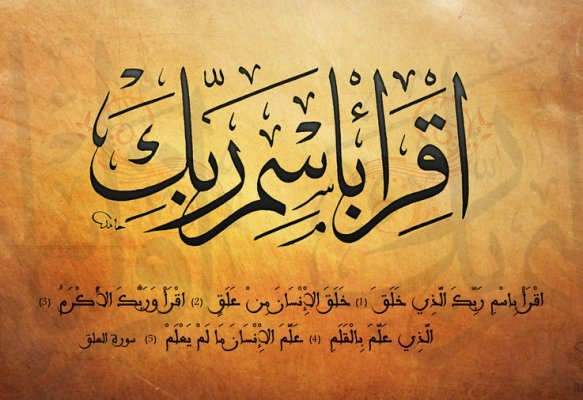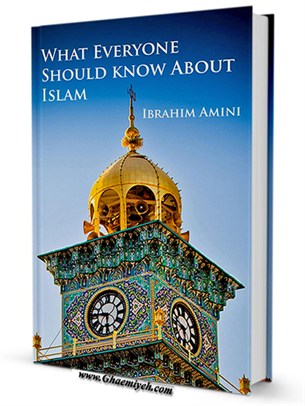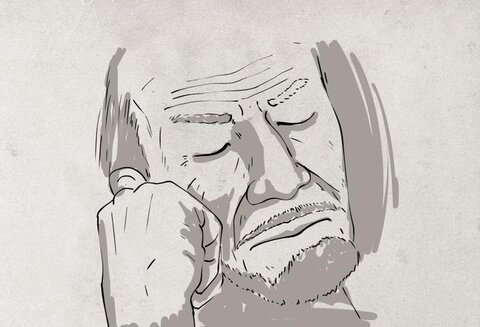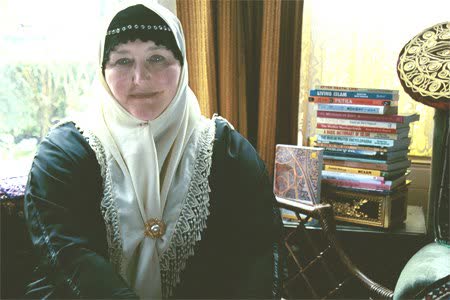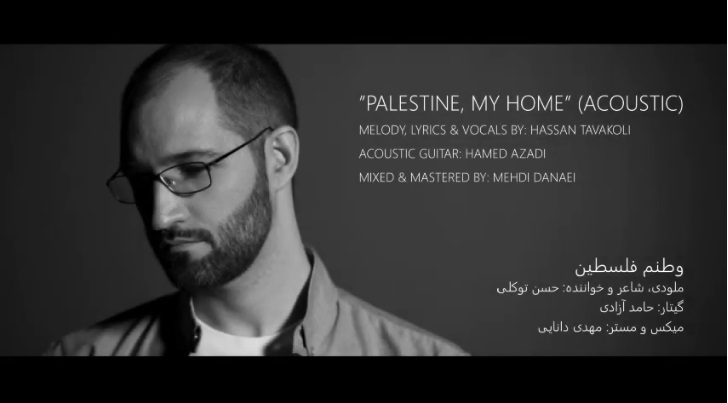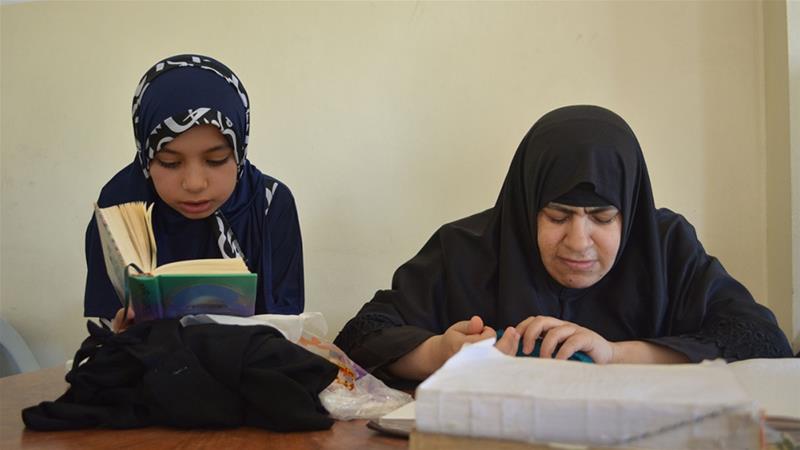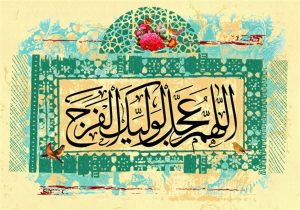According to Rahyafte(the missionaries and converts website):While the number of people converting to Islam isn’t tracked, some Twin Cities mosques have seen a noticeable increase, especially in the last six months. “It’s really tapping into the humanity of people,” one local imam said, of the response to the humanitarian crisis in Gaza.
Brooke Anderson spent her Ramadan like most Muslims: She prayed, read Quran, listened to Islamic lectures, and attended community events at mosques. One key difference—this is Anderson’s first Ramadan.
“Once I took my shahada,” she said, referring to the profession of faith required to become a Muslim, “it was like, ‘Okay, this is a clean slate.’ It’s made me way more conscious of what I’m doing, what I’m immersing myself in, and who I’m spending my time around.”
The 29-year-old St. Paul hospice nurse became a Muslim in January at Masjid Al-Ihsan in St. Paul. She’s among many new Muslims who recently joined the faith.
Local Muslim community leaders said they’ve noticed an increase in people converting to Islam over the last six months to a year. While the number of people converting to Islam in Minnesota is not officially tracked, mosques and local organizations have been keeping a rough count, and partly attribute it to people learning about Islam because of the humanitarian crisis Muslims face in Gaza.
The Israeli regime’s war on Gaza that began in October has killed 33,207 people, according to Gaza Health Ministry reports. The World Health Organization predicts that famine in Gaza is imminent. Muslim organizations across the world have emphasized fundraising efforts for Palestinians during the Islamic holy month of Ramadan, a time for fasting, charity, and faith.
“We noticed a lot more convert to Islam in the last five to six months,” said Anab Ibrahim, a community leader at Masjid Al-Ihsan. “A lot of people learned about Islam at the start of the genocide on the Palestinian people in Gaza.”
Anab, who helped Anderson learn more about Islam after she converted, said that in previous years, one to three people converted at Masjid Al Ihsan every six months or so. She’s noticed that in the past six months, one to two people convert, or take the shahada, every week after Friday prayers at the mosque.
Islam is one of the fastest growing religions in the United States and worldwide, according to the Pew Research Center. Researchers project that, from 2015 to 2060, the number of Muslims is expected to increase by 70%, and make up three out of 10 people in the world.
Local leaders observe uptick
Sia Lao, 36, coordinates programming for new Muslims at Building Blocks of Islam, a nonprofit organization based in Columbia Heights that supports Muslims in the Twin Cities.
Lao is asked to reach out to new Muslims about five times a month. Last year, she said, it was one or two a month.
“It increased so much,” Lao said of the growth from last year to this year. “I think it’s because of Gaza. Mostly, it’s because of personal reasons, but that is a part of it.”
Lao converted to Islam in 2012 and became involved at Building Blocks of Islam a few years afterwards. She reaches out to new Muslims to see how she can support them, and also organizes a free closet for women to find modest clothing. She’s been delivering dinner boxes during Ramadan to more than 100 Muslim converts, disabled Muslims, and Muslims facing financial hardship across the state.
Makram El-Amin, an imam at Masjid An-Nur in north Minneapolis, has also seen a steady increase of people converting at his mosque, particularly in the last month.
“The heightened exposure to Islam and Muslims through the plight of Palestinians—it doesn’t take a lot to convince me that this is a major factor,” El-Amin said. “It’s really tapping into the humanity of people. People are just responding to that in many ways.”
Fifty to 60 people have converted to Islam at Masjid An-Nur since Ramadan in 2023, –Amin said, adding that the number has at least doubled from previous years.
“What we’re seeing at Masjid An-Nur is just a microcosm of what is happening across the country,” El-Amin said. “This is, to be honest, the prophetic nature of the Quran, where Allah said people come to the religion in masses.”
While the reasons people are interested in Islam vary, El-Amin said that most converts already have a connection to Islam, whether that’s through friends or family members, or through learning about Islam on their own. A portion of the new Muslim population converted while they were incarcerated, El-Amin said.
The mosque offers classes on Sundays for new Muslims to learn more about Islam and meet other Muslims. El-Amin said the mosque is also piloting a Muslim mentorship program as well.
Joining a new faith
Anderson was formerly part of the Krishna Consciousness religion. She said first became interested in Islam after reading poetry by Rumi, an Islamic scholar and poet that practiced Sufism, a sect of Islam.
“Things that didn’t align with me there were just answered in what I found in Islam,” Anderson said.
Oliver Swanson, her friend of eight years and now fiancé—first told her more about Islam. Swanson converted in 2020.
“It’s funny, because this is her first Ramadan, but she really strengthens me,” Swanson said. “Brooke is really devotional. I like to get into the nitty-gritty knowledge and studying books. I like exchanging a lot of that knowledge with her.”
Swanson has always been interested in studying religion. He came across a Quran on a bookshelf in 2018, and began studying Islam. He spent two years learning about the faith before he said the shahada.
“He was always immersed in it, talking about it, and praying,” Anderson said. “I got to pray for my first time with him.”
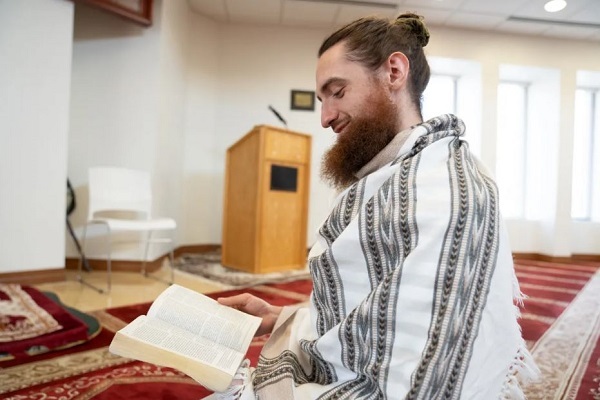
As she observed him and read more about Islam, Anderson found answers she couldn’t find in her previous faith practices.
“That’s a common theme I’ve seen in people,” Swanson said. “When they come to Islam, it provides a really balanced approach to religion. From some of the other perspectives that Brooke came from, she felt like this path really reconciled some of those balances she was looking for.”
When Anab met Anderson in January, she thought Anderson was already Muslim even though she had not yet said the shahada.
“She was very prepared,” Anab said. “I thought she had been Muslim for a long time, because she sat with us and prayed with us before she even took the shahada. Then, someone told me she was here to convert, and it made me so happy.”
While Anderson said learning about the crisis in Gaza was not a direct reason for her conversion, she said she has felt empowered by the resilience of Muslims in Palestine.
“There’s a bunch of things I’ve seen [online] during Ramadan, like people breaking their fasts amidst the rubble of their home and having barely anything to break their fast with,” Anderson said.
She added that it’s made her appreciate that despite her fast, “We’re still being fed.”
Anderson said she’s had a fairly easy time adjusting to Ramadan. She’s taken time off of work as she transitions jobs. She has observed more intense fasts in her previous faiths. Practicing Islam alongside Swanson, as well as new friends she’s made at Masjid An-Nur during this month has also helped. Volunteering to cook dinner at Masjid An-Nur has been the highlight of Anderson’s Ramadan.
“It’s been super powerful,” Anderson said. “It’s felt like this little retreat and I’m finally feeling like I’m getting home-time that I’ve needed. We’ve just been fasting and listening to lectures, and getting to the masjid when we can.”
As the end of her first Ramadan approaches, Anderson said she’s thinking about how to incorporate the habits she’s built in her practice into her daily life, such as listening to the Quran while she drives to work, continuing to read more, and becoming more connected to the larger Muslim community.
“I’m trying to keep a steadfast practice,” Anderson said. “What are things I can learn now?”
Her next task, she said, might be to learn Arabic.
Source: sahanjournal.com






